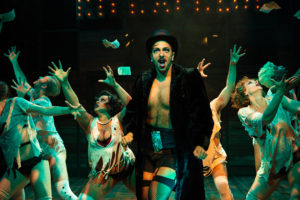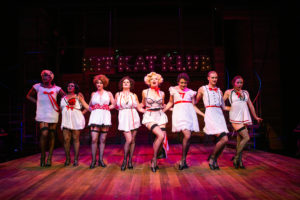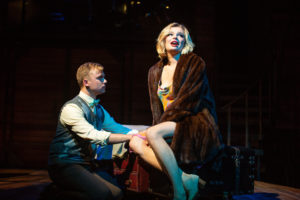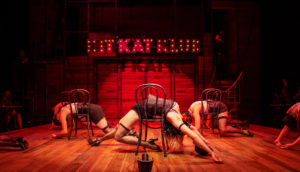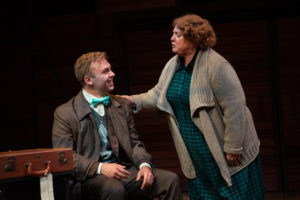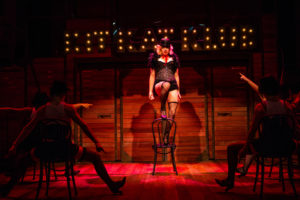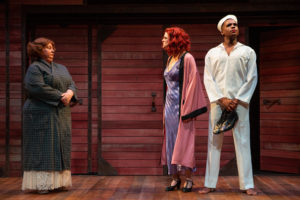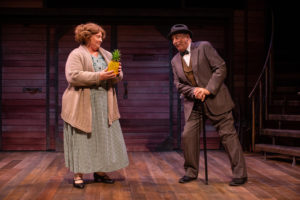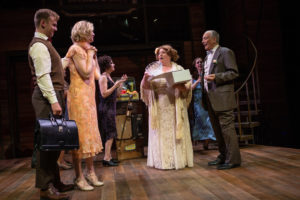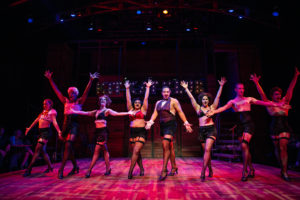GO TELL MAMA: CABARET‘S A HIT
Cabaret was and remains one of the boldest and most innovative experiments in the history of musical theater, a ravishing work that has neither lost its power nor its pertinence no matter what one does with it, and it is gratifying to report that the new production at the San Francisco Playhouse is a seriously good, theatrically electrifying, dramatically thrilling portrait of a moment in history that can never be ignored — the rise of Nazism in post-depression Germany — because it should never be repeated. It of course looks a lot like a metaphor for own own bewildering times.
Director Susi Damilano always takes this into account which gives the evening the weight it deserves, but, even more, she turns it into an event that is as thorough a scintillating entertainment as it is a frightening omen of things to come. And she brings out all the beauty of the work in ways that makes it essential to be seen where it belongs: in a theater.
For those who have only seen the film version, seeing it in its original form is a revelation. And seeing it done this brilliantly is a further revelation even for those who may have seen it in a theater before.
Sally Bowles, who has returned to her origins as a lost soul whose dreams are bigger than her talents, is one of the many characters in Christopher Isherwood’s I-wrote-it-where-and-when-it-happened collection of Berlin Stories, and remained the focus of John Van Druten’s stage adaptation I Am a Camera. Harold Prince’s reimagined musical version introduced the Master of Ceremonies, or Emcee, a character who theatrically put Sally less in the center than on the margins.
Prince also replaced the lovers in the subplot of Camera with a more expansive portrait of the landlady Fräulein Schneider, this time romantically connected to her Jewish tenant. These characters were jettisoned in Bob Fosse’s film version in favor of the original younger couple in Camera. And, since Isherwood was gay, Fosse added homosexuality into the story. As interpreted by Liza Minnelli, Sally had more than enough talent to win the UFA contract she dreamed of, which put things a bit out of balance; but she sure knew how to sell those songs.
And then in the British revival, Sam Mendes played with ideas from all the versions and added the Emcee’s androgyny to the mix, and returned the original lostness of Sally to its proper place in the proceedings. Now, she is someone caught between the decadence of the era — personified by the Emcee — and the moral authority of the visiting Isherwood who had become in Cabaret Clifford Bradshaw from Scranton.
Got all that? At any rate, it’s good to have Sally back where she belongs. And Cate Hayman is so good in the part that it’s almost like seeing Sally for the first time. Her interpretations of “Mein Herr” and “Don’t Tell Mama” — executed with a loose brilliance — show off the songs but also prove that Sally’s not ready for UFA, and indeed could even get laid off by her lecherous and profit-conscious boss, which, in fact, is what happens in the course of things. And, in the title song, Hayman gives us Sally in all her confusion and desperation and fear as well as what remains of her determination. It is the most extraordinary version of “Cabaret” I have ever heard or seen. The image of Sally Bowles goes all the way back to the character Isherwood created, the one which inspired Van Druten, and which Mendes tried to resurrect. This time, she is on equal footing with the Emcee.
And that is a feat when you consider the magnificent creation of John Paul Gonzales in the part. He is the ultimate performer, a hulking presence, volatile and aggressive, all without losing a bit of slinky charm. And his gender fluidity has a danger in it that is both of its time and completely contemporary. He is decadent but he is also a man with a job. Behind the flashing eyes, there is an ordinary guy.
The real revelation of this production is Jennie Brick, whose Fräulein Schneider is a stunning depiction of a practical, level-headed, even drab, old woman who is doing her best to survive in Depression-era Germany. Her “So What?” is done in such an off-hand manner that she emanates defeat and resilience simultaneously, and practically sets the tone of the evening in perfect counterpoint to Gonzales’s thrilling “Willkomen.”
But everyone in this company is very good, although Atticus Shaindlin is particularly believable as the gentle but firmly moral Bradshaw, and Abby Haug has some bright moments as boarding house prostitute Fräulein Kost. All the design elements are superbly professional. And Nicole Helfer’s choreography, while unashamedly borrowing from Fosse and from Rob Marshall, has a distinct style of its own.
If there is one thing to be faulted, it is the first act finale, which ends not with the bang it should have, but with an unexpected whimper, and a kind of kiss-my-ass in lieu of a slap in the face. It leaves one in a state of anxiety during intermission, which may have been what was intended. But it doesn’t play. It is noticeable, because everything else does play, and play fabulously. Its final moments possess a power that not only contain memories of the past but speak to the moment in which we are living.
photos by Jessica Palopoli
Cabaret
San Francisco Playhouse
450 Post St. in Union Square
ends on September 14, 2019
for tickets, call 415-677-9596 or visit SF Playhouse

